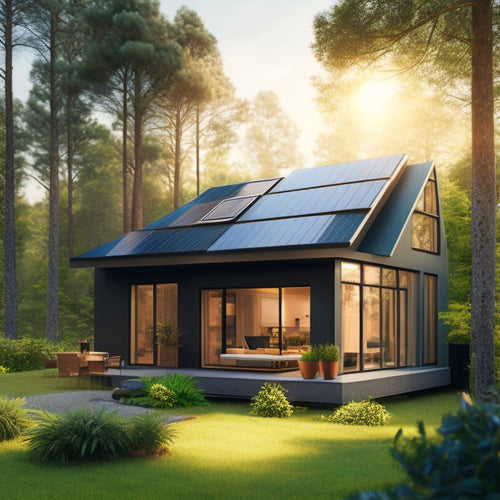
What Is the Standard Size of a Residential Solar Panel?
Share
You'll typically find that residential solar panels come in standard sizes ranging from 39 to 41 inches in width and 65 to 67 inches in length, striking a balance between efficiency and cost. These dimensions allow for smooth installation, compatibility with most mounting systems, and scalability to adjust to your energy needs. Additionally, standard-sized panels provide sufficient power output, making them a versatile option for residential use. As you investigate your solar panel options, understanding the standard size is just the beginning - you'll also want to evaluate other factors that impact performance and efficiency.
Key Takeaways
- Standard residential solar panels typically range from 39 to 41 inches in width and 65 to 67 inches in length.
- These standard sizes balance efficiency and cost, providing sufficient power output for most residential needs.
- Compatibility with most mounting systems ensures a smoother installation process for standard-sized panels.
- Scalability allows adjustments based on energy needs, making standard-sized panels versatile for residential use.
- Standard dimensions accommodate various installation requirements, making them a popular choice for homeowners.
Understanding Residential Solar Panels
As you contemplate shifting to renewable energy, understanding residential solar panels becomes crucial. You need to know the different solar panel types and their installation factors to make an informed decision.
There are three main types of solar panels: monocrystalline, polycrystalline, and thin-film. Monocrystalline panels are the most efficient but also the most expensive. Polycrystalline panels are a cost-effective alternative, while thin-film panels are the least expensive but least efficient.
When it comes to installation, you'll need to take into account the roof size, orientation, and shading. The ideal roof size for solar panels is between 100 and 400 square feet. South-facing roofs with little to no shading are ideal, as they receive the most sunlight.
You'll also need to factor in the installation method: flush mounting, tilt mounting, or tracking systems. Additionally, local building codes, permits, and warranties should be taken into account.
Standard Dimensions of Solar Panels
Most residential solar panels come in standard sizes, typically ranging from 39 inches to 41 inches in width and 65 inches to 67 inches in length. These dimensions are designed to accommodate various installation requirements and are suitable for most solar panel types.
When considering solar panels for your home, you'll likely come across these standard dimensions. Here's what you need to know:
-
Efficiency: Standard-sized solar panels offer a good balance between efficiency and cost. They provide sufficient power output while being affordable and easy to install.
-
Compatibility: Standard dimensions guarantee compatibility with most mounting systems and installation equipment, making the installation process smoother and more efficient.
-
Scalability: Using standard-sized solar panels allows you to easily scale up or down depending on your energy needs, making them a versatile option for residential solar installations.
Variations in Solar Panel Sizes
While standard sizes are prevalent, manufacturers do offer variations in solar panel sizes to cater to specific needs or unique installation requirements. You'll find different panel types customized to distinct solar panel applications.
For instance, residential solar panels often come in smaller sizes to accommodate rooftop installations with limited space. In contrast, commercial or industrial solar panels may be larger to maximize energy generation on expansive rooftops or open fields.
You might require custom-sized solar panels for non-standard roof shapes, historical buildings, or unique design structures. In such cases, manufacturers can provide bespoke panels that fit your specific needs.
Additionally, specialized solar panels, like thin-film or bifacial panels, may have varying dimensions due to their unique technology and application requirements.
When selecting solar panels, consider the specific requirements of your installation. Be sure to consult with a professional to determine the ideal panel size and type for your project.
Measuring Solar Panel Efficiency
How efficiently do solar panels convert sunlight into electricity? That's an essential question when it comes to utilizing the power of the sun. The answer lies in the solar panel's efficiency rating, which is a measure of how well the panel converts sunlight into electrical energy.
The efficiency of a solar panel is determined by the quality of its solar cell technology. High-efficiency panels use advanced technology to maximize energy production, while lower-efficiency panels may not perform as well.
Here are some factors that affect a solar panel's efficiency:
-
Temperature: High temperatures can reduce a panel's efficiency, which is why panels are often designed to operate within a specific temperature range.
-
Reflection: The amount of sunlight that's reflected off the panel's surface can impact its efficiency.
-
Shading: Shading from trees, buildings, or other obstructions can greatly reduce a panel's efficiency.
When shopping for solar panels, look for efficiency ratings that indicate how well the panel will perform in real-world conditions. Higher efficiency ratings typically translate to more power per hour of sunlight.
Choosing the Right Solar Panel
You've evaluated the efficiency of solar panels, and now it's time to select the right one for your residential needs. With various solar panel types available, it's crucial to take into account your specific requirements.
Monocrystalline, polycrystalline, and thin-film solar panels are the most common types, each with its advantages and disadvantages. Monocrystalline panels are the most efficient but also the most expensive, while polycrystalline panels offer a balance between efficiency and cost. Thin-film panels are the least efficient but most affordable.
When choosing a solar panel, take into account installation considerations such as roof size, orientation, and shading. You'll need to confirm the panel's wattage and voltage meet your energy requirements.
Additionally, reflect on the durability and warranty offered by the manufacturer. Look for panels with a high IP (Ingress Protection) rating for protection against environmental factors.
Frequently Asked Questions
Can Solar Panels Be Installed on a Metal or Clay Tile Roof?
You can install solar panels on a metal roof, ensuring compatibility with standing-seam or corrugated metal roofs, and on clay tile roofs, but you'll need specialized installation techniques and equipment to secure the panels without damaging the tiles.
How Often Should I Clean My Residential Solar Panels?
Like a car needing regular oil changes, your solar panels require periodic cleaning to optimize energy output; aim to clean them every 6-12 months, or as needed, to maintain peak solar panel maintenance and guarantee maximum power generation.
Do Solar Panels Work During a Power Outage?
During a power outage, you'll be glad to know that your solar panels won't provide electricity directly, but you can invest in a battery backup system or a grid-tie inverter with backup capabilities for reliable power outage solutions, ensuring your solar panel functionality shines through.
Are Solar Panels Resistant to Hail and Extreme Weather?
You'll be relieved to know that most solar panels are designed to withstand hail damage and extreme weather conditions, boasting impressive weather durability, with many manufacturers testing their products to guarantee they can resist hail up to 1 inch in diameter.
Can I Install Solar Panels Myself or Diy?
Don't worry, you're not a pro, but you're keen to save on labor costs; however, attempting DIY solar panel installation without a thorough DIY solar guide can be risky, so it's essential to weigh the benefits against potential electrical and safety hazards.
Related Posts
-

Why Go Green With Automotive Products Online?
By switching to eco-friendly automotive products online, you're taking a significant step towards reducing your carbo...
-

Safety First: Why Seniors Need Advanced Vehicle Features
As you get behind the wheel, you're likely unaware that seniors are 16% more likely to be involved in a fatal car cra...
-

Reduce Solar Panel Cost for Your Small Home
By evaluating your energy needs, choosing the right installer, and selecting cost-effective solar panel options, you ...


